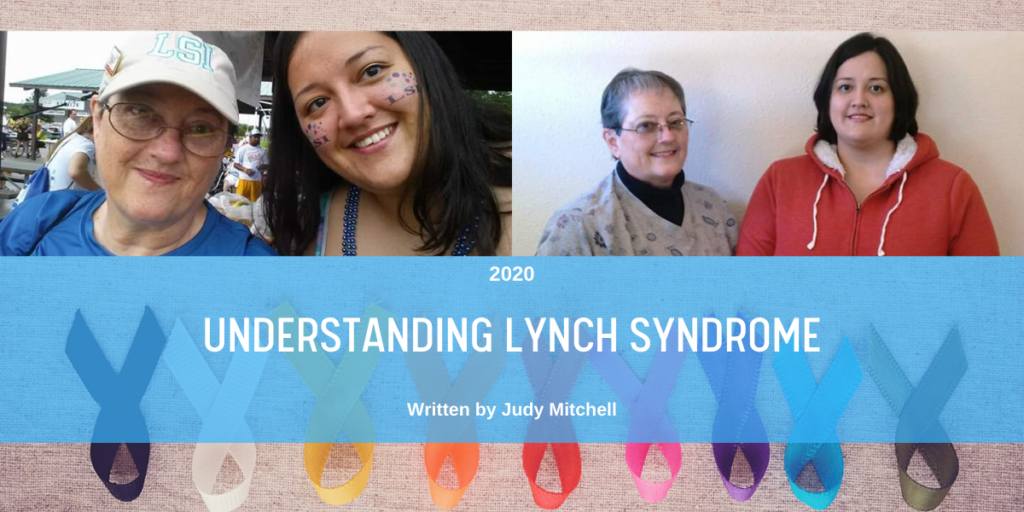Understanding Lynch Syndrome

My name is Judy Smelser Mitchell. I have Lynch syndrome.
What is Lynch Syndrome
Lynch syndrome, also known as hereditary non-polyposis colorectal cancer (HNPCC), is the most common cause of hereditary colorectal cancer. People with Lynch syndrome typically acquire their cancer at a younger age (before 50) with the most common cancer sites being colon and uterus but also include ovary, stomach, rectum, small intestine, liver, ureter, renal pelvis, pancreas, brain, and certain types of skin cancers.
Learn more: https://www.cdc.gov/genomics/disease/colorectal_cancer/lynch.htm
Lynch syndrome is due to inherited changes (mutations) in genes that affect DNA mismatch repair, or the process of ‘spell-checking’ to correct mistakes when DNA is copied. Normally, these genes can protect a person from getting certain cancers, but the mutations within these genes prevent them from working properly.
Everyone has two copies of each of the genes involved in Lynch syndrome, one from their mother and one from their father. Even if a person inherits a mutation in a Lynch syndrome gene, they still have the normal copy of the gene from the other parent. Cancer occurs when a second mutation affects the normal working copy of the gene, so that the person no longer has a normal copy. Unlike the inherited Lynch syndrome mutation, the second mutation would not be present throughout the person’s body, but only present in the cancer tissue. However, not everyone with Lynch syndrome will get cancer.
Colorectal cancer also can be caused by mutations in genes other than those related to Lynch syndrome. This means that some families with a history of colorectal cancer will not have mutations in a Lynch syndrome gene. These mutations might be picked up through genetic testing using multigene panels, which look for mutations in several different genes at the same time (CDC, 2020).
A Family History of Cancer

Judy Mitchell and daughter Melissa at Get Your Rear in Gear in Des Moines
Growing up I knew that in at least four generations of my dad’s family men had died of stomach or colon cancers. My daughter was hospitalized with severe abdominal pain and a high fever in 2011 at the age of 33. A CT scan showed an inflamed colon. The doctors suggested colitis and I shared that a niece and nephew had colitis. Instead, the diagnosis was a large cancer of the sigmoid colon.
The GI doctor asked if I or her father had had colon cancer, and I said we had not. However, I told him that my great-grandfather had died of stomach cancer. Additionally, his son (my grandfather) died of colon cancer at age 34, my dad’s brother died of colon cancer at age 26 and my father died of stomach cancer at age 42. My brother had colon cancer at age 31.
My daughter’s oncologist ordered a genetic test for Lynch syndrome. When her result came back positive, he ordered one for me looking for the same specific mutation. Once my results were available, we contacted my siblings and they also tested. Three of my five siblings were positive. Then, the adult children of those three were encouraged to do the genetic test. About half of those nieces and nephews also have the mutation. I’ve also shared information about Lynch syndrome with cousins.
The More You Know
 We’ve learned that it is vitally important to know one’s family’s heath history and to share that information with our medical providers – and our extended family. Individuals are more likely to have Lynch syndrome if their family has a strong history of colorectal cancer. Family members who inherit Lynch syndrome usually share the same mutation. If one of your family members has a known Lynch syndrome gene mutation, other family members who get genetic testing should be checked for that mutation.
We’ve learned that it is vitally important to know one’s family’s heath history and to share that information with our medical providers – and our extended family. Individuals are more likely to have Lynch syndrome if their family has a strong history of colorectal cancer. Family members who inherit Lynch syndrome usually share the same mutation. If one of your family members has a known Lynch syndrome gene mutation, other family members who get genetic testing should be checked for that mutation.
If you are concerned that you could have Lynch syndrome, or another mutation related to colorectal cancer, the first step is to collect your family health history of colorectal cancer and share the information with your health provider (CDC, 2020).
For additional information see:
